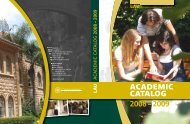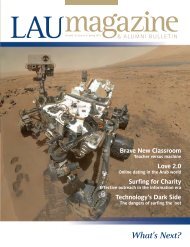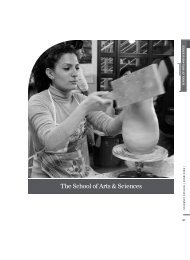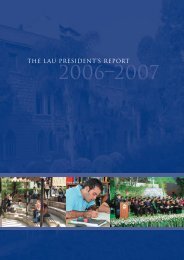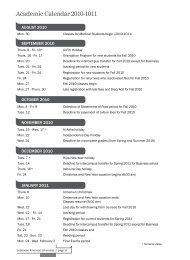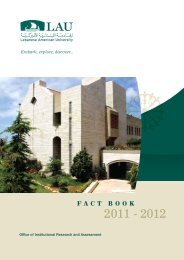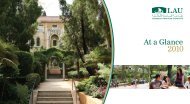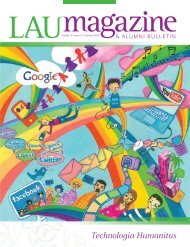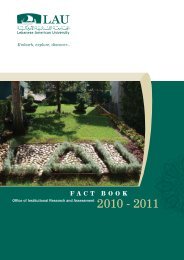academic-catalog2011.. - LAU Publications - Lebanese American ...
academic-catalog2011.. - LAU Publications - Lebanese American ...
academic-catalog2011.. - LAU Publications - Lebanese American ...
Create successful ePaper yourself
Turn your PDF publications into a flip-book with our unique Google optimized e-Paper software.
Department of Humanities<br />
HST301 Europe in Late Antiquity 410-1066<br />
[3 – 0]<br />
This course is a survey of European history from<br />
the fall of Rome to the beginning of the Norman<br />
Conquest of Britain. Topics to be covered include<br />
conditions in Europe throughout Late Antiquity<br />
and the Early Middle Ages; the nature and<br />
spread of the Germanic tribes—Goths, Vandals,<br />
Franks, Huns, and others—and a critical look at<br />
labels like “Barbarians” and “Dark Ages;” the<br />
rise of Western monasticism; the Iconoclastic<br />
Controversy and early Christological disputes;<br />
the Merovingians and Carolingians; Clovis<br />
and Charlemagne; the eastern and western<br />
empires; the clashing authorities of popes and<br />
kings; and the ecclesiastical schism of 1054.<br />
Primary works to guide the discussion include<br />
the writings of Tacitus, St. Augustine’s City of<br />
God, Boethius’ Consolation of Philosophy, the<br />
writings of John Scotus Eriugena, St. Gregory<br />
of Tours’ History of the Franks, the Rule of St.<br />
Benedict, the mystical writings of Dionysius the<br />
Areopagite (Pseudo-Dionysius), Pope Gregory<br />
the Great’s Pastoral Care, Venerable Bede’s<br />
Ecclesiastical History, and more.<br />
HST302 Medieval Europe 1066-1453 [3 – 0]<br />
This course is a study of medieval European<br />
history from the Norman Conquest of Britain<br />
to the fall of Constantinople at the hands of<br />
Mohammad the Conqueror. Major topics<br />
include the Crusades, the founding of Europe’s<br />
great universities, the rise of scholasticism,<br />
Gothic architecture and the great cathedrals,<br />
the medieval guilds, the Concordat of Worms<br />
of 1127, the Magna Carta of 1215, Marco<br />
Polo’s Venice, the Hundred Years War, and the<br />
Council of Florence in 1439. Philosophical<br />
and religious figures like Abelard and Heloise,<br />
Peter Lombard, Anselm, Bonaventure, Albertus<br />
Magnus, Thomas Aquinas, Roger Bacon,<br />
Meister Eckhart, Moses Maimonides, Thomas<br />
Becket, Duns Scotus, William of Ockham,<br />
Nicholas of Cusa, and Thomas a Kempis, as<br />
well as literary figures like Boccaccio, Dante,<br />
and Chaucer will be covered through readings in<br />
their original texts and/or through authoritative<br />
scholarly investigations. The emergence<br />
of the Franciscan and Dominican monastic<br />
orders, St. Bernard of Clairvaux, Petrarch, and<br />
Gutenberg are also some of the themes that<br />
will be stressed, as will the latest scholarship on<br />
everyday life in medieval Europe.<br />
HST303 Early Modern Europe 1450-1750<br />
[3 – 0]<br />
This course concentrates on the Italian and<br />
Dutch Renaissance, the Protestant Reformation,<br />
and the Catholic Counterreformation in Europe.<br />
It covers the period from the outbreak of the<br />
Wars of the Roses in 1455 to the beginnings of<br />
the Industrial Revolution in the mid-eighteenth<br />
century. It also treats the Age of Discovery that<br />
brought Europeans to the New World starting<br />
in 1492 and sent them to the far corners of<br />
Africa and Asia. Renaissance humanism and its<br />
monumental achievements in art, architecture,<br />
and literature will be emphasized. The great<br />
intellectual encounter among Christians,<br />
Muslims, and Jews in Andalusia and the<br />
termination of Arab rule there in 1492 at the<br />
hands of Ferdinand and Isabella of Spain will be<br />
an important sub-theme, as will the start in 1481<br />
of the Spanish Inquisition. Socio-economic<br />
conditions in early modern Europe and the<br />
rise of mercantilism will be investigated as well<br />
and related to broader political and cultural<br />
developments. The beginnings of the scientific<br />
revolution at the hands of Copernicus, Kepler,<br />
Galileo, Tycho Brahe, Newton, and Leibniz will<br />
also be covered. Tudor and Stuart England,<br />
the reigns of Queen Elizabeth and Henry VIII,<br />
the Wars of Religion ending with the Edict of<br />
Nantes in 1598, the Thirty Years War (1618-<br />
1648) ending with the Treaty of Westphalia,<br />
and the Glorious Revolution of 1688 are crucial<br />
milestones for the cumulative narrative of this<br />
course. Naturally, figures like Ignatius of Loyola,<br />
Erasmus, Shakespeare, Bacon, Descartes,<br />
Pascal, Hobbes, Locke, Milton, More, Spinoza,<br />
Vico, and others will be an integral part of the<br />
historical narrative.<br />
HST304 Modern Europe 1750-1945 [3 – 0]<br />
This course treats the period starting with the<br />
Industrial Revolution in Britain and ending with<br />
the culmination in 1945 of the Second World War.<br />
Crucial events of special focus entail the <strong>American</strong><br />
Revolution of 1776 and the French Revolution<br />
of 1789, both approached comparatively<br />
but also with a view to showing the intricate<br />
historical connections between the two related<br />
transatlantic upheavals; the Napoleonic era; the<br />
1815 Vienna settlement; the 1848 revolutions<br />
throughout Europe; The Crimean War of 1854;<br />
the unifications of both Italy and Germany; Whigs<br />
and Tories; Victorian England; the era of the New<br />
Imperialism; the 1917 Bolshevik Revolution;<br />
and the First and Second World Wars and the<br />
inter-war period. Culturally, the treatment will<br />
include discussions of the Age of Reason and the<br />
French Encyclopedists; romanticism; socialism;<br />
the idea of progress; nationalism; evolutionism;<br />
anticlericalism; impressionism; existentialism;<br />
fin-de-siecle Vienna; cubism; symbolism;<br />
surrealism; the absurd; and the “Social Gospel”<br />
and NeoThomist responses of the Catholic<br />
Church beginning with Pope Leo XIII and the First<br />
ACADEMIC CATALOG [ 2011-2012 ] SCHOOL OF ARTS AND SCIENCES<br />
157



